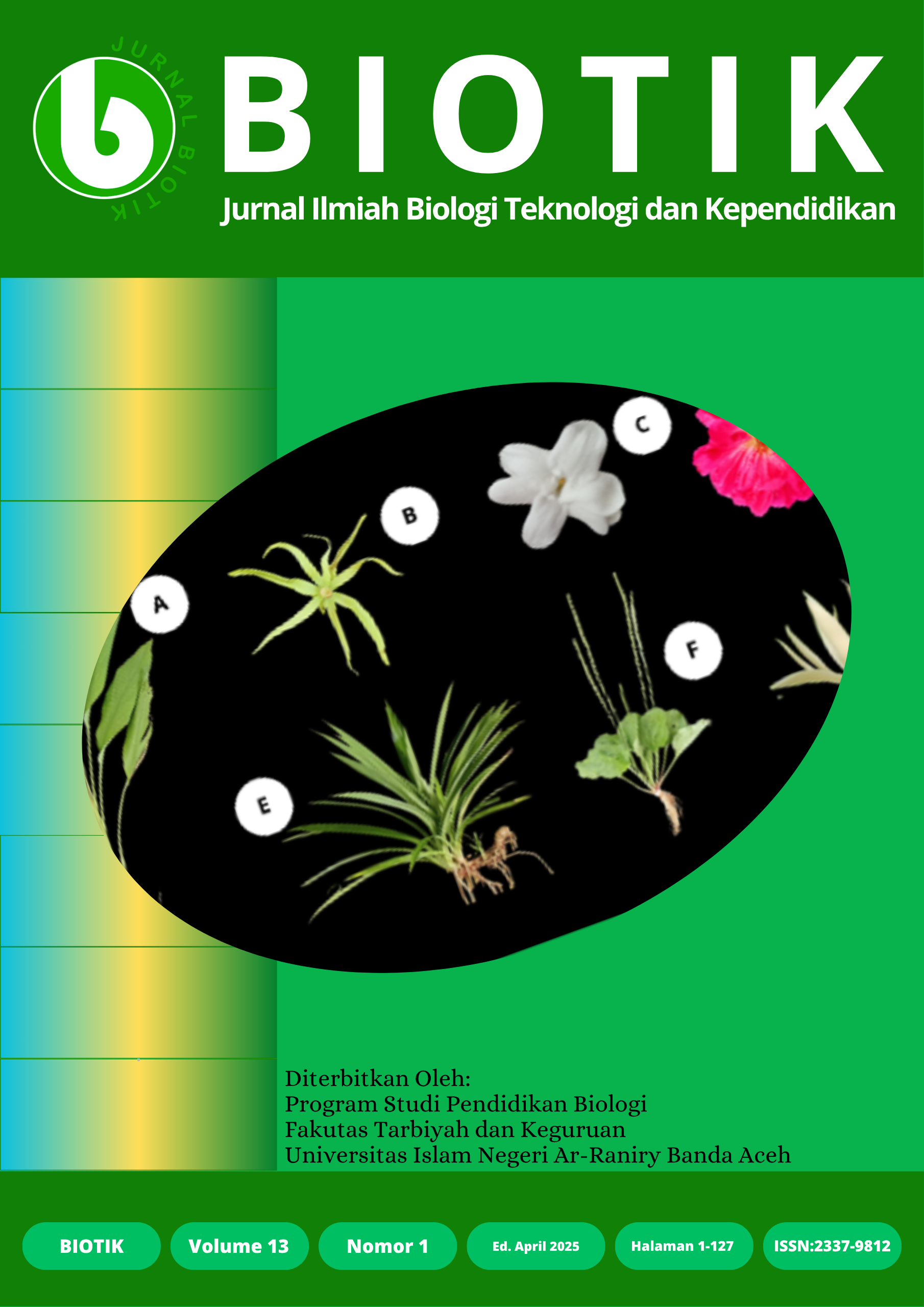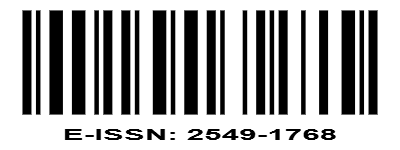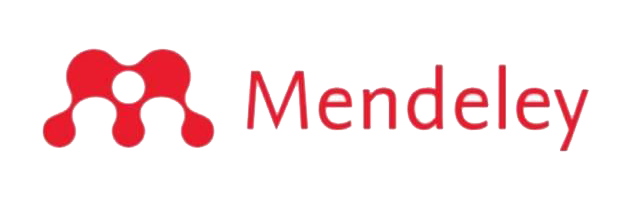Effectiveness of Pjbl-Based E-LKPD Implementation in Teaching Plant Tissue Materials
DOI:
https://doi.org/10.22373/biotik.v13i1.26559Keywords:
e-LKPD, PjBL (Project Based Learning), Plant Tissues.Abstract
This development research was conducted based on the difficulties faced by teachers. The aim of this research is to produce an e-LKPD that is valid, practical, effective, and appealing for students in the subject of plant tissues. The applied learning model is expected to assist teachers in creating engaging learning media. This research employs the Systematic Literature Review (SLR) method as its research methodology. This involves selecting each relevant journal or prior study and compiling their results as references for the model or idea to be developed. The study involves collecting information and data from reliable sources such as international scientific journals, seminar proceedings, research reports, and reference books. The data in this research consists of a literature review of previous studies sourced from journals published between 2020 and 2024. From several scientific articles that were examined and compared, it can be concluded that several studies using simulation models in their learning processes have been successfully implemented and applied to both students and teachers, at the elementary school and vocational high school levels.
Downloads
References
Kadir, A. Dasar-dasar pendidikan. Kencana. 2015.
Pristiwanti, D., Badariah, B., Hidayat, S., & Dewi, R. S. Pengertian pendidikan. Jurnal Pendidikan Dan Konseling (JPDK), 4(6), 7911-7915. 2022.
Putriani, J. D., & Hudaidah, H. Penerapan Pendidikan Indonesia Di Era Revolusi Industri 4.0. Edukatif: Jurnal Ilmu Pendidikan, 3(3), 830-838. 2021.
Kartini, D., Nurohmah, A. N., Wulandari, D., & Prihantini, P. Relevansi Strategi Pembelajaran Problem Based Learning (PBL) dengan Keterampilan Pembelajaran Abad 21. Jurnal Pendidikan Tambusai, 6(2), 9092-9099. 2022.
Festiawan, R. Belajar dan pendekatan pembelajaran. Universitas Jenderal Soedirman, 11. 2020.
Marliani, N. Peningkatan kemampuan berpikir kreatif matematis peserta didik melalui model pembelajaran missouri mathematics project (MMP). Formatif: Jurnal Ilmiah Pendidikan MIPA, 5(1). 2015.
Safaruddin, S., Ibrahim, N., Juhaeni, J., Harmilawati, H., & Qadrianti, L. The effect of project-based learning assisted by electronic media on learning motivation and science process skills. Journal of Innovation in Educational and Cultural Research, 1(1), 22-29. 2020.
Baidowi, A., Sumarmi, S., & Amirudin, A. Pengaruh model pembelajaran berbasis proyek terhadap kemampuan menulis karya ilmiah geografi siswa sma. Jurnal Pendidikan Geografi: Kajian, Teori, dan Praktek dalam Bidang Pendidikan dan Ilmu Geografi, 20(1), 6. 2015.
Komalasari, K. Pembelajaran kontekstual konsep dan aplikasi. Bandung: Refika Aditama. 2010.
Hosnan, M. Pendekatan Saintifik dan Kontekstual dalam Pembelajaran Abad 21 Bogor: Ghalia Indonesia. 2014.
Safaruddin, S., Ibrahim, N., Juhaeni, J., Harmilawati, H., & Qadrianti, L. The effect of project-based learning assisted by electronic media on learning motivation and science process skills. Journal of Innovation in Educational and Cultural Research, 1(1), 22-29. 2020.
Brassler, M., & Dettmers, J. How to enhance interdisciplinary competence—interdisciplinary problem-based learning versus interdisciplinary project-based learning. Interdisciplinary Journal of problem-based Learning, 11(2). 2017.
Handayani, D., Winarni, E. W., Sundaryono, A., & Firdaus, M. L. Implementation of project-based learning model with Edmodo application in the capita selecta chemistry course. IJORER: International Journal of Recent Educational Research, 2(2), 184-195. 2021.
Riyadi, M., & Rahayu, Y. Strengthening the 21st century skills of elementary school students through the implementation of project based learning. In Social Sciences, Humanities and Economics Conference (SoSHEC 2017) (pp. 253-255). Atlantis Press.
Nur, M., Sahidu, H., & Kosim, K. Pengaruh model pemecahan masalah polya berbantuan LKPD terhadap kemampuan menganalisis materi fisika peserta didik SMAN 1 Selong Tahun Pelajaran 2016/2017. Jurnal Pendidikan Fisika dan Teknologi, 3(2), 155-163. 2017.
Crisp, G. Teacher’s Handbook on e-Assessment. Transforming Assessment-An ALTC Fellowship Activity, 18. 2011.
Kitchenham, B., Brereton, O. P., Budgen, D., Turner, M., Bailey, J., & Linkman, S. Systematic literature reviews in software engineering–a systematic literature review. Information and software technology, 51(1), 7-15. 2009.
Ritonga, M. Studi Literatur Efektivitas Model Pembelajaran Simulasi Digital. Prosiding Nasional Pendidikan: LPPM IKIP PGRI Bojonegoro, 2(1), 63-70. 2021.
Ayuni, M. S., Distrik, I. W., & Viyanti, V. The Effect of E-LKPD Assisted PJBL-STEM Learning Model on Scientific Reasoning Ability and Argumentation Performance of Class XII Science Students in Renewable Energy Materials. Physics Education Research Journal, 4(2), 79-86. 2022.
Aldi, S. Adnan & Ismail. Effectiveness of e-LKPD Based on Science Process Skills Assisted Learning Management System Material Semester I Class XI SMA. 2022.
Muwaffaqoh, D., Kirana, T., & Rachmadiarti, F. The development of e-book based on project based learning on the plant anatomy structure material. IJORER: International Journal of Recent Educational Research, 2(4), 416-431. 2021.
Novianto, E. Improving Students' Science Process Skills through PjBL learning assisted by collaborative project LKPD. Reflection Journal, 3(2), 88-95. 2023.
Rahmawati, W., & Alimah, S. E-LKPD Based on Problem Solving as Innovative Teaching Materials to Improve the Ability to Analyze and Data Presentation on Plant Tissue. Journal of Biology Education, 11(1), 31-39. 2022.
Downloads
Published
Issue
Section
License
Authors who publish with BIOTIK: Jurnal Ilmiah Biologi Teknologi dan Kependidikan agree to the following terms:
- Authors retain copyright and grant the journal right of first publication with the work simultaneously licensed under a Creative Commons Attribution License that allows others to share the work with an acknowledgement of the work's authorship and initial publication in this journal.
- Authors are able to enter into separate, additional contractual arrangements for the non-exclusive distribution of the journal's published version of the work (e.g., post it to an institutional repository or publish it in a book), with an acknowledgement of its initial publication in this journal.
- Authors are permitted and encouraged to post their work online (e.g., in institutional repositories or on their website) prior to and during the submission process, as it can lead to productive exchanges, as well as earlier and greater citation of published work.












